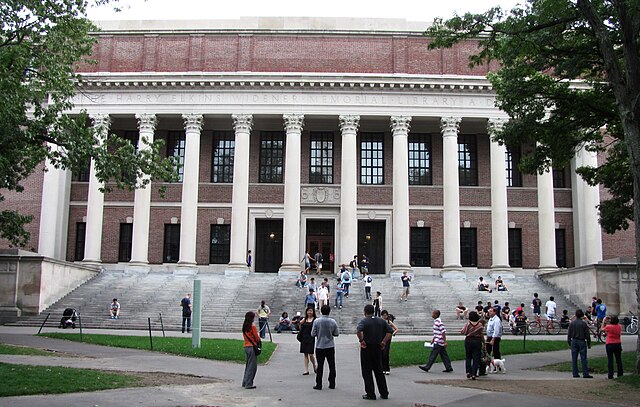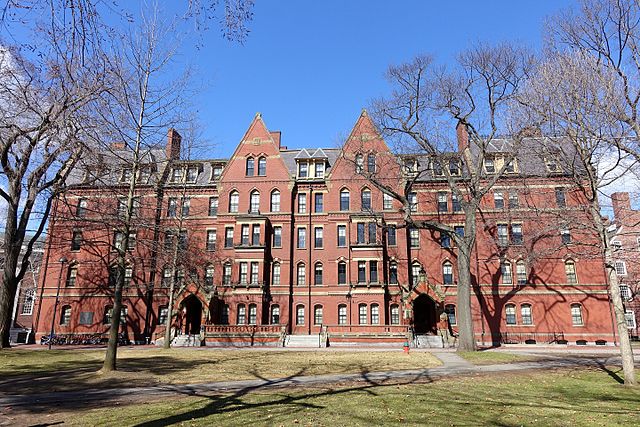
As Thammasat University students grow more accustomed to distance learning and online courses, they might wish to consider taking an occasional free class online at an international university to learn while improving their English language skills.
As TU students know, Harvard University is a private Ivy League research institituion in Cambridge, Massachusetts, the United States of America. As of March 2020, 160 Nobel laureates, 18 Fields Medalists, and 14 Turing Award winners have been affiliated with Harvard as students, faculty, or researchers.
The Thammasat University Library owns many books published by Harvard University Press, for many years a leading academic publisher.
Like some other international universities, Harvard University offers a range of massive open online courses (MOOCs) that TU students may consider.
In the field of law, these include Contract Law: From Trust to Promise to Contract
Contracts are a part of our everyday life, arising in collaboration, trust, promise and credit. How are contracts formed? What makes a contract enforceable? What happens when one party breaks a promise?
About this course
Learn about contracts from Harvard Law Professor Charles Fried, one of the world’s leading authorities on contract law. Contracts are promises that the law will enforce. But when will the law refuse to honor a promise? What happens when one party does not hold to their part of the deal? This version of the course adds new units on Interpretation, Agency, Partnerships, Corporations, and Government Regulation.
We are exposed to contracts in all areas of our life — agreeing to terms when downloading a new computer program, hiring a contractor to repair a leaking roof, and even ordering a meal at a restaurant. Knowing the principles of contracts is not just a skill needed by lawyers, it illuminates for everyone a crucial institution that we use all the time and generally take for granted.
This contract law course, with new materials and updated case examples, is designed to introduce the range of issues that arise when entering and enforcing contracts. It will provide an introduction to what a contract is and also analyze the purpose and significance of contracts. Then, it will discuss the intent to create legal relations, legality and morality, and the distinction between gifts and bargains. The course also investigates common pitfalls: one-sided promises, mistake, fraud, and frustration. With the knowledge of what makes contracts and how they can go wrong, Professor Fried will discuss remedies and specific performance. Finally, Professor Fried will introduce how contracts can create rights for third parties.
The course’s instructor, Charles Fried, has been teaching at Harvard Law School for more than 50 years and has written extensively on contracts. Not only is Professor Fried a leading authority on contract law, but he also utilizes a story-telling approach to explaining the topic, which creates a unique and interesting class experience.
What you’ll learn
- A theoretical background of contracts, trust, and promise
- How to form contracts through valid offer and acceptance
- Limits to enforcing contracts
- Issues excusing contractual performance
- Available remedies for contractual breaches
- Third parties’ ability to enforce contracts
- The limitations of contract law
- How courts interpret contracts
- Relationship of Contracts to Agency, Partnership, Corporations and Regulation
- How to read through contracts to apply these key concepts and understand potential issues and outcomes
The TU Library collection includes a copy of the classic text by Professor Fried, Contract as promise: a theory of contractual obligation.
It is shelved in the General Stacks of the Sanya Dharmasakti Library, Faculty of Law, Thammasat University, Tha Prachan campus.

In the field of social sciences, one of the many MOOCs being offered by Harvard is
Child Protection: Children’s Rights in Theory and Practice
Learn how to protect children from violence, exploitation, and neglect through law, policy, and practice in a human rights framework.
About this course
Across the world, children are at risk from violence, abuse, exploitation, and neglect. Conflict and natural disasters have forced millions to flee their homes and confront the dangers of migration and displacement. Commercial sexual exploitation and trafficking, child labor, and child marriage are problems in many countries. At-risk children and adolescents need their rights enforced if we are to protect them from harm and to ensure that they develop to their full potential.
Led by Jacqueline Bhabha, Research Director of the Harvard FXB Center for Health and Human Rights, this course will teach you the causes and consequences of child protection failures. You will consider the strategies, international laws, standards, and resources required to protect all children. You will be able to link legal frameworks and child-rights approaches to the work of policymakers, lawyers, health workers, educators, law enforcement, and social workers. Learners will come to understand how they can ensure the protection of children and apply child protection strategies to their own work.
Join Harvard faculty, practitioners, and a global community of learners to master a child-centered systems approach to preventing and responding to violence, exploitation, and abuse against children.
What you’ll learn
- The origins of child protection in international human rights law
- How to analyze global child protection issues and the diversity of actors involved in child protection
- The impact of violence, exploitation, and abuse (VEA) on children’s emotional, social and physical development and strategies for preventing and responding to these harms
- The standards of protection for children in conflict or in contact with the law
- How to assess and strengthen a child protection system
In the field of public health, there is also
Improving Global Health: Focusing on Quality and Safety:
An introduction to the emerging field of global healthcare quality.
About this course
Improving access to healthcare is only as useful as the quality of care provided. Many agree that quality is important – but what is it? How do we define it? How do we measure it? And most importantly, how might we make it better?
The course is designed for those who care about health and healthcare and wish to learn more about how to measure and improve that care – for themselves, for their institutions, or for their countries. Each session will be interactive and provide concrete tools that students can use. We will empower you to raise questions, propose concrete solutions, and promote change.
We have assembled leading thinkers from around the globe – not only people who are experts – but people with real, hands-on experience running organizations, hospitals, and ministries of health. So join us – whether you are a physician, nurse, or other healthcare provider, if you are a student of medicine, public health, or health policy, or a patient who simply cares about getting good care – this course is for you.
What you’ll learn
- The relationship between quality and population health
- A framework for understanding and thinking about healthcare quality
- Approaches to quality measurement
- The role of information and communication technology in assessing and improving quality
- Tools and contextual knowledge to improve the quality delivered in health systems
The course instructor is Professor Ashish Jha, Director of the Harvard Global Health Institute.
Dr. Jha’s research interests lie in improving the quality and costs of healthcare delivery systems with a specific focus on the impact of policy efforts. His work has focused on a broad set of issues including how best to measure and improve quality, the role of information technology, transparency, and financial incentives to improve care, and how leadership and management are central to the delivery of high value healthcare.
(All images courtesy of Wikimedia Commons)

